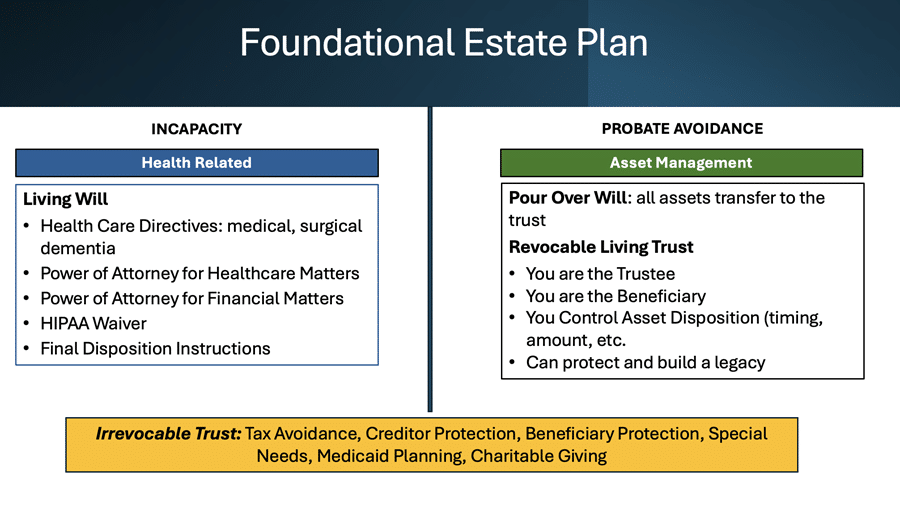Starting a Company: A Short Guide in Easy Language

A Short Guide in Easy Language to Starting a Company
Business Formation
Your choice of business entity is a pivitol decision. It will impact such things as ownership, liability, taxes, profit sharing, operational flexibility, general management, eventual sale, and so much more. Too often, the importance of this decision is overlooked or not fully understood by entrepreneurs.
This is a short guide in easy language to help you understand the issues associated with corporate formation. This guide also addresses the various types of entities you can choose from and the associated factors such as Taxes, Insurance, and Intellectual Property. These are all factors that are critical to consider when choosing the right type of corporate entity for your business.
C-Corp
- Typically, you will want to incorporate in your state of domicile. For a small corporation, there is typically no benefit to file in Delaware versus Colorado or New Mexico, for example. In fact, the costs of maintianing a small business incorporated in Delaware are not insignficant.
- C-Corp has double taxation. First, the Corporation pays taxes on earnings. Second, each individual pays tax on any distributions and/or wages.
- Primary Benefits
- Easy structure to raise serious money.
- Allows for multiple types and classes of Stock.
- Allows for debt instruments (loans) between Shareholders and the Corporation.
- Typical incorporation Documents Required:
| C-Corp | |
| Name Reservation | Research name availability in the state where incorporating |
| Articles of Incorporation | Filed with Secretary of State of State of domicile |
| Bylaws | Operating Rules for the corporation |
| Action by Written Consent of Sole Incorporator | Assigns Corporation to Directors to Manage |
| Action by Written Consent Board | Legitimizes formation (approves incorporation, appoints Chairman of the Board, Approves Bylaws, appoints officers, designates powers of officers, approves initial stock purchases by founders. |
| EIN | Tax Id Number. IRS Form SS-4 |
| Founders Stock Purchase Agreement | See Securities Regulations below |
| Tax / License Registrations | Depending upon your state of incorporation: General business license, sales tax license, employer taxes (if any), use taxes |
| Securities Registrations | All sales of stock (even founders) must comply with Federal and State Securities Laws. No outright solicitation of investment allowed. Exemptions from registration available based on size of offering (amount of money invested), type of investor, etc. Need to talk to an attorney and need very specific documentation for each purchase: Stock Purchase Agreements; Restriction on Transfer Agreements, 83B elections (to firm up your basis in the stock – relevant upon sale or dissolution). |
Limited Liability Company (LLC)
- Taxation. An LLC can elect to be treated, for tax purposes, as a corporation, a partnership, or a “disregarded entity”
- An LLC with 2 or more members is treated and taxed as a partnership, unless they file from 8832 and elects to be treated as a corporation.
- This requires a fairly complex system of accounting through capital accounts (like a partnership) where basis is constantly adjusted based on earnings or losses.
- Income and losses are allocated pro-rata to each memeber based on their share percentage ownership.
- Distributions of earnings, however, do not have to be in proportion to percentage ownership, as it only impacts a member’s capital account.
- Tax liability is based on earnings and not distributions. This means a member can incur tax liability even if the LLC makes no distributions, because, for instance, it retains its earnings to invest in growth. So, you must be prepared to cover taxes on earnings even if no cash is paid out to the members.
- Single member LLC’s are treated as “disregarded entities” such that any earnings are taxed at the owner’s personal tax rate. There are NO separate corporate taxes or filings.
- Distributions are considered to be “wages” and aresubject to self-employment tax of 15.3% (over and above your personal income tax rates).
- Stock issued for services is not a tax-free event but is considered to be “income” to the recipient.
- An LLC with 2 or more members is treated and taxed as a partnership, unless they file from 8832 and elects to be treated as a corporation.
- Governance. LLC’s can be either Member managed or a Manager can be appointed (much like a Director/Officer in a C-Corp). The “manager” can appoint officers and describe their duties: President, Vice President, Secretary, etc.
- Risks: Far too often, single memeber LLC’s are created by filing the appropriate state required documents, but the rest of the necessary corporate documents, like an Operating Agreement, are not created. This results in the “Limited Liability” part of the corporation being subject to attack by creditors and others.
- Typical incorporation Documents Required:
| LLC | |
| Name Reservation | Research name availability in the state where incorporating |
| Articles of Organization | Filed with Secretary of State |
| Operating Agreement | Operating Rules for the business, including liability protection, indemnification, etc. THIS IS A MUST! Must determine if it is a members managed company (all members must have an active operating role) or manager managed {impacts securities issues below} |
| Initial and Annual Reports | Filed with the Secretary of State |
| EIN | Tax ID Number. IRS Form SS-4 |
| Tax / License Registrations | Depending upon your state of incorporation: General business license, sales tax license, employer taxes (if any), use taxes |
| Securities Registrations | All sales of membership units must comply with Federal and State Securities Laws (not applicable to initial founders where all members have an operating role). If under 35 members and no outright solicitation, it is not too difficult, but exemption from registration forms will need to be filed with the SEC. |
S-Corp
A corporation is a creature of State Stautory Law. But an “S-corp” status is a creature of Federal law. An S-Corp is NOT a separate Corporate Structure perse, but it is an IRS concept and can be utilized regardless of your corporate structure (whether a C-Corp, a Partnership, an LLC, or a Trust). There are rules about filing for this status, but it is best to file within 45-days of your incorporation. IRS Form 2553 must be physically signed in 2-places. Electronic signatures on the form are not allowed. Forms must be printed and phsycially signed.
- The General Requiements are:
- 1 class of stock
- Limited members: 100
- All must be US Citizens or Legal Residents
- All owners must be “Elgible Owners” meaning that they just be individuals or certain Trusts or Estates.
- Unanimous shareholder/member consent to file for S-Status (if in a community property state, all spouses must provide written consent as well)
- Limitations on type of debt (loans) provided by Members/Shareholders.
- Allows for conversion back to a C-Corp
- Primary Benefit
- For a C-Corp: allows the corporation to essentially be taxed as a partnership eliminating the double taxation.
- For an LLC, Members can declare a reasonable salary to which the self-employment tax of 15.3% is applied. All other distributions are NOT considered to be wages and are NOT subject to the self-employment tax.
Taxes
There are many opportunities to make serious errors, especially with an LLC and an S-Corp status. This can create serious liability that you do not want. Therefore, find yourself a trustworthy and specifically knowledgeable CPA. They need to specialize in corporation and LLC’ tax law. A general practice CPA will NOT do.
Insurance
You will need general liability insurance and any other coverages specific to your business. For instance, in the event of a product recall where people get sick from listeria or other bacteria, you need to ensure that your insurance covers you (especially if you are outsourcing manufacturing and development).
Intellectual Property
Most companies put themselves at risk for failure to protect their intellectual property.
Trademark your brand!
-
- Federal registration with the USTPO
- Costs: $300-$800 (excluding attorney fees) based on number of marks to be protected.
- May need an attorney. Let’s talk once you have your branding developed.
Trade Secrets:
- Your recipes, formulation, unique manufacturing processes, etc., need to be treated as proprietary Trade Secrets in order to protect them. The key is very limited exposure to third-parties. If handled right, the law will give you the right to restrict others from using or disclosing your Trade Secrets. A party not bound by a signed agreement protecting your Trade Secrets is not prevented from independently duplicating and using the secret information.
- You must make reasonable efforts to maintain secrecy.
- Institute special procedures for handling the data.
- Implement technological security measures. Use an encrypted portal like “Sync” to pass information between the company and your developer, manufacturer, etc.).
- Have every third-party with access to the data to be under a contract addressing:
- General non-disclosure.
- Efforts are “works for hire” with all rights being preserved to your corporation.
- Non-competes (if allowable – based on local law)
- You must make reasonable efforts to maintain secrecy.

